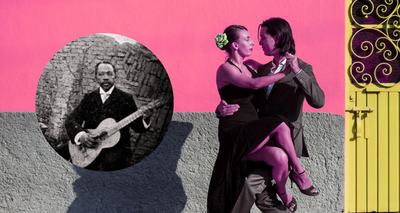Latinas in law enforcement and/or Latina police officers are breaking new ground, representing a growing force in U.S. law enforcement, while shattering gender barriers and showcasing the strength of diversity and community dedication. These ‘Latina Firsts’ are not just trailblazers, they are paving the way for the next generation of women and especially Latinas to continue transforming the industry.
A report published by Statista indicates that in 2023, only 13.8 percent of full-time police officers were women, while 86.2 percent were men. On the other hand, 59.9 percent of full-time civilian employees in law enforcement agencies were women. This significant difference highlights a notable gender disparity between operational and administrative roles within law enforcement.
Although Latinas represent a small percentage within this 13.8 percent, each of these women is making a significant impact through their stories of resilience and dedication to service. Women like Lucero Aguilera Vásquez, Verónica Cruz, Rubí Flores, Perla Reyes, and Liza Johansen are shaping a unique perspective that balances leadership with empathy. Are more women in the police force and more women of color as police officers the key to bringing law enforcement closer to marginalized communities? Here we showcase stellar examples of Latina police officers across the country who might prove that a diverse police force is a necessity.
Lucero Aguilera Vásquez
Lucero Aguilera Vásquez has found a way to proudly represent the Latino community through her role as a police officer in Kentucky. Her mission as a police officer is to serve as a bridge between law enforcement and Hispanics, a responsibility she has embraced with determination.
From a young age, Aguilera understood the significant challenges Latino families face when interacting with law enforcement, often due to cultural and language barriers. She arrived in the U.S. from the Dominican Republic at just 8 years old. After graduating as a nursing assistant, she realized she wanted to do more for her community, which led her to join the police force.
“We’re not just part of the community; we’re here to protect and represent it,” she has said in several interviews.
Officer Aguilera Vásquez actively participates in community programs aimed at building trust between residents and law enforcement. Over her career, she has witnessed many situations, but one moment that stood out to her was when a distressed Latina mother, caught in a family dispute, felt relieved upon hearing that she could speak Spanish with the officer.
“That cultural connection transforms the experience and fosters trust,” Aguilera explains.
She sees every interaction as an opportunity to break stereotypes and prove that Latinas in law enforcement can be both leaders and protectors. However, challenges remain. Aguilera emphasizes the need for mentorship programs, scholarships, and recruitment campaigns to ensure that more Latinas can join the police force and continue transforming the relationship between law enforcement and the communities they serve.
Verónica Cruz
Verónica Cruz was studying mathematics and engineering when she discovered her true calling: serving the community. It was then, in October 2017, that she enrolled in the academy to become a police officer. Like many Latino families, hers also distrusted law enforcement, a sentiment often tied to the corruption prevalent in Latin America. However, Cruz wanted to see things through the eyes of the police, a determination that has driven her six-year career.
“When I told my parents I wanted to become a police officer, they were worried because they thought it was too dangerous. They saw it as more of a man’s job than a woman’s, but eventually, they realized I was serious, and they began to support me more,” Cruz told La Noticia.
The North Carolina officer highlighted the need to integrate more women into law enforcement. She estimated that in the Independence Division of the CMPD, there is one female police officer for every seven male officers. While Cruz noted that her colleagues treat her equally to the men, she acknowledged that differences exist when it comes to the Latino community.
“Sometimes I’ve had to be tougher because people, often under the influence of alcohol, behave disrespectfully. It’s also common in Latino culture for them to call me ‘Güey’ or ‘Mami,’ and I have to demand that they address me as an officer and understand they can’t refer to me that way. I remind them I’m here for a reason to understand what’s going on,” Cruz explained.
Captain Gene Lim, part of the CMPD recruitment division, pointed out that some CMPD departments already have a 15 percent representation of female police officers. The CMPD is among many agencies that have signed onto the 30x30 Initiative, a program spearheaded by the National Association of Women Law Enforcement Executives (NAWLEE) and the Policing Project at NYU School of Law. The initiative aims to recruit more female police officers and achieve 30 percent representation of women in law enforcement by 2030, as Captain Lim told Police Magazine.
Rubí Flores
Ruby Flores became the first deputy police chief of the Los Angeles Police Department (LAPD) in 2024. As the daughter of immigrants from Ciudad Juárez, Mexico, Flores has overcome the barriers and challenges of a profession traditionally dominated by men, rising to oversee more than 2,000 officers.
Inspired by personal experiences that underscored the importance of fair and empathetic treatment, Flores committed herself to transforming the system from within.
“I was about 21 years old, and I was in a car accident by myself and ultimately stranded and victimized by a stranger in an attempted assault. Ultimately, they found the suspect, and I went to court. The suspect was arrested, but the process was eye-opening to me because, as a woman, I felt that I was not treated appropriately,” Flores said.
In addition to her operational responsibilities, Flores has prioritized inclusion and diversity within the force, emphasizing the importance of creating an environment where all police officers feel valued. Her leadership also seeks to inspire women and girls, showing them that with confidence and effort, any barrier can be overcome.
“I want to make sure if I can impact young girls and women in a positive way by being in this leadership position, then I want to do that and will continue to do that,” Flores said.
Ruby Flores represents not only a personal triumph, but also a beacon of hope for future generations striving for justice and equality at all levels.
Perla Reyes
Perla Reyes has served in the Marietta Police Department in Georgia for over 10 years. Her exemplary work in patrolling, investigating crimes against individuals and minors, and training detectives led to her promotion to sergeant.
Reyes highlights that her fluency in both Spanish and English has been instrumental in building a bridge between the growing Hispanic community and law enforcement, fostering trust and communication. Beyond her police duties, Reyes has volunteered in programs like RadKids and PAL, reaffirming her commitment to youth education and well-being.
A graduate of Marietta High School and Kennesaw State University, Reyes takes great pride in her Mexican heritage, seamlessly blending her cultural identity with her professional calling. However, she acknowledges the challenges she faced early in her career, particularly as a Latina in a family with no history of law enforcement. She credits her parents' unwavering support as key to her success.
One of her most important messages is that the Marietta Police Department is there to serve everyone, regardless of immigration status. Reyes also encourages bilingual Latino youth to join the force and strengthen its diversity.
“If you’re a victim of a crime, don’t be afraid to report it. We’re here to help you, not judge you,” she emphasizes.
Reyes’ story is a powerful reminder that Latinas in law enforcement or Latina police officers are necessary. It underscores that with dedication and hard work, there are no limits to what can be achieved.
Liza Johansen
Liza Johansen took command as captain of San Francisco’s Mission Police Station in 2023, succeeding Captain Thomas Harvey. She is the second woman to hold this position at the Mission Station, following Rachel Moran, who served from February to November 2021.
For Captain Johansen, engaging with the community is paramount to fully understanding local issues, enabling her and her team to develop long-term action plans.
“I grew up here, worked as an officer here for four years, and served as a lieutenant here for three years. I believe knowing the community in person is vital,” Johansen said.
Approximately 65.2 million Hispanics live in the United States, accounting for more than 19 percent of the country’s total population, according to Census Bureau data released on July 1, 2023. This significant demographic representation highlights the importance of increasing the presence of Latinas and Latinos in law enforcement.
The inclusion of Latinas in law enforcement and/or Latina police officers is crucial to addressing the community's key concerns, fostering trust, and overcoming barriers like language and skepticism toward authorities. By prioritizing protection for all individuals, regardless of immigration status, Latinas in law enforcement embody the values of justice and community-centered service.






